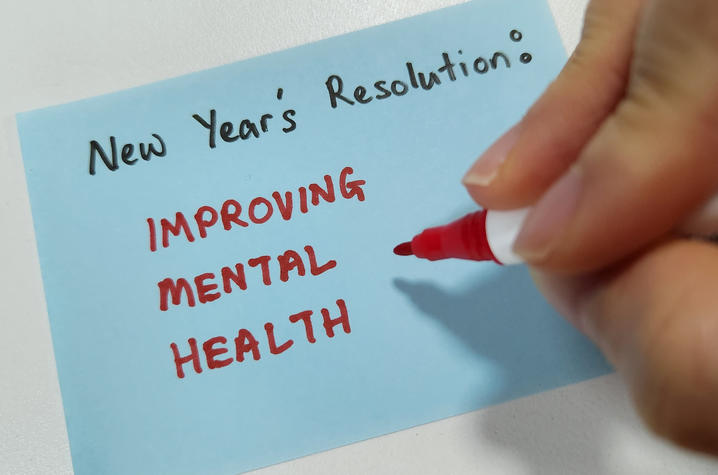New year, new goals: Tips for putting mental health first in 2025

The University of Kentucky Public Relations & Strategic Communications Office provides a weekly health column available for use and reprint by news media. This week’s column is by Marc Woods, D.N.P., Eastern State Hospital chief nursing officer and Lindsey Jasinski, Ph.D., psychologist and Eastern State Hospital chief administrative officer.
LEXINGTON, KY. (Jan. 6, 2025) – As we celebrate the start of a new year, it’s time to set new goals for 2025. For many people, it’s a great opportunity to reset and focus on mental health. To be successful in prioritizing mental health this year, keep the following tips in mind:
Limit screen time
The National Institutes of Health suggests adults should limit nonwork-related screen time to two hours per day. There is also evidence that shows people with a high amount of screen time often have connections to anxiety and depression. Reducing screen time can improve sleep, reduce stress and make time for more social connections, all of which improve mental health. Set app timers on your phone or designate screen-free zones, like the dining table or bedroom, to help reduce distractions.
Get enough sleep
Sleep and mental health are connected. It is recommended for adults to get seven to nine hours of sleep each night. Not getting enough sleep or poor sleep quality can cause irritability, loss of focus and anxiety. To improve sleep, create a sleep schedule, develop a relaxing bedtime routine, avoid screen time 30 minutes before bed, and avoid stimulants like caffeine and alcohol in the afternoon and evening.
Exercise
Exercise increases the production of endorphins and serotonin, which are commonly referred to as “feel-good” chemicals in our brain, leading to improved mood. Exercise can also lower stress levels and decrease the frequency of panic attacks. All forms of activity and moving the body can help take your mind off negative thought patterns. Not a fan of the gym? Try a brisk walk in your neighborhood, stretching at home or even dancing to your favorite music. Find what brings you joy and stick with it.
Find balance to boost resilience
Everyone has daily tasks that are required of them, and too many “must-do” items can lead to burnout. Balance is important: Find ways to pair things you enjoy with other stressful tasks. Play a favorite song while doing household chores. Keep uplifting quotes around areas where you might feel stressed. Build resilience by challenging yourself to do one thing a day that is hard, then recognize your hard work with self-kudos. Small steps and bits of enjoyment can have a big impact on mood and stress.
Try talk therapy
Psychotherapy or talk therapy is when someone attends sessions with a therapist to talk through their experiences. Attending sessions with a licensed therapist, counselor, social worker or psychiatrist can help improve a person’s ability to cope with stress, overcome anxiety, gain an understanding of their emotions and identify how to improve overall mental health. Therapy isn’t just for crises; it’s a valuable tool for anyone looking to better understand themselves or navigate life’s challenges.
Ask for help
It can feel difficult to ask for help with mental health, but it’s a brave and important step toward feeling better. It’s important to ask for help if you are feeling overwhelmed and unable to cope with everyday stressors. It’s also a sign to seek help if you notice a persistent shift in mood, behaviors or thoughts. Reaching out for help shows courage and no one should go through mental health challenges alone.
The 988 Crisis Hotline, previously known as the National Suicide Prevention Lifeline, offers 24/7 call, text and chat access to trained crisis counselors who can help people experiencing suicidal, substance use, and/or mental health crisis, or any other kind of emotional distress. People can also call, text or chat 988 if they are worried about a loved one who may need crisis support. Additionally, UK HealthCare’s new EmPATH emergency psychiatric unit is available 24/7 to patients 18 and older to help treat and connect patients quickly to critical mental health services.
For additional mental health resources at UK, students can use TRACS (Triage, Referral, Assistance and Crisis Support). The physical and virtual one-stop shop offers a quick referral to support services and direct clinical support for a range of mental health needs.
Services are offered in-person and virtually, 8 a.m.-5 p.m. Monday-Friday. For more information on TRACS, visit go.uky.edu/tracs.
To learn more about mental health resources available to staff and faculty, visit the UK HR website.
UK HealthCare is the hospitals and clinics of the University of Kentucky. But it is so much more. It is more than 10,000 dedicated health care professionals committed to providing advanced subspecialty care for the most critically injured and ill patients from the Commonwealth and beyond. It also is the home of the state’s only National Cancer Institute (NCI)-designated Comprehensive Cancer Center, a Level IV Neonatal Intensive Care Unit that cares for the tiniest and sickest newborns and the region’s only Level 1 trauma center.
As an academic research institution, we are continuously pursuing the next generation of cures, treatments, protocols and policies. Our discoveries have the potential to change what’s medically possible within our lifetimes. Our educators and thought leaders are transforming the health care landscape as our six health professions colleges teach the next generation of doctors, nurses, pharmacists and other health care professionals, spreading the highest standards of care. UK HealthCare is the power of advanced medicine committed to creating a healthier Kentucky, now and for generations to come.




